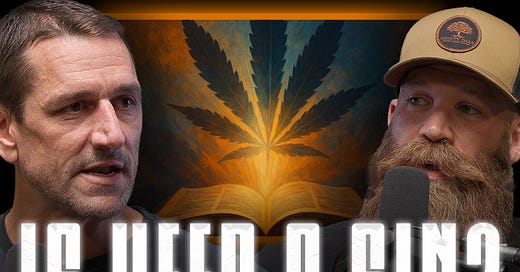What Does The Bible ACTUALLY Say About Marijuana?
Is It Wise for Christians to Smoke Marijuana? Three principles for discernment in an age of easy access.
You’ve probably noticed how quickly cannabis has moved from counter-culture to commonplace. Dispensaries dot the landscape, social stigma is fading, and many believers are asking: If it’s legal, is it really a big deal?
In Episode 8 of our Hard Questions Series, March or Die hosts Jeremy Stalnecker and Sean Kennard dig deep into that tension. Rather than handing down a simple yes or no, they challenge us to apply broader biblical principles, principles that go far beyond marijuana and shape virtually every “gray-area” decision we make.
Below is our Forward Edge field-guide to the conversation: key takeaways, Scripture references, and next-step questions to help you process the issue for yourself or with your community.
Liberty ≠ Wisdom
“All things are lawful unto me, but all things are not expedient.”
- 1 Corinthians 6:12
Legality is a minimum standard, not a measure of Christ-centered living. The New Testament repeatedly calls us to choose what is expedient, that is, beneficial for God’s glory and our growth not merely what is permitted.
Ask yourself: Will this practice sharpen my capacity to love God and serve others, or dull it?
Refuse to Surrender Control
“The purpose of consuming cannabis is to get high, to be intoxicated.”
“Be sober, be vigilant… your adversary the devil … walketh about, seeking whom he may devour.” — 1 Peter 5:8
THC is purpose-built to alter perception. Scripture’s call to sober-mindedness isn’t prudish, it’s a wartime alertness. Anything that routinely hands the reins of your thoughts to a substance puts you at risk of spiritual ambush.
Consider: Where might you already be tempted to “check out” instead of leaning in to God’s Spirit?
Don’t Medicate What Christ Wants to Heal
“When you are consuming cannabis, you’re not dealing with the actual issues that you’re trying to mask or hide.”
Many veterans and first responders that have come through Mighty Oaks programs have turned to self-medication for trauma relief. While self-medication may numb the symptoms, it doesn’t address the underlying issues. Jeremy reminds us that numbing pain is not the same as addressing its root. Galatians 5:22-23 lists the very peace and self-control people chase through THC, yet labels them fruit of the Spirit, not fruit of a plant.
Action step: If anxiety or lingering wounds drive the urge to use, invite a trusted friend or counselor into that space. Substitute community and prayer for isolation and escapism.
Walking It Out
Audit your motives. Before any gray-area liberty, jot down why you want to partake. Would you be comfortable praying that motive aloud?
Embrace healthier rhythms. Exercise, sleep hygiene, and biblical meditation often relieve the same stressors people try to mute with substances.
Guard your witness. Even if you feel personally free, Paul’s “appearance of evil” warning (1 Thessalonians 5:22) still matters. Ask: Could this confuse younger believers or damage gospel credibility with my neighbors?
Watch the Full Conversation
Catch the episode here for the complete back-and-forth and share it with someone wrestling through the same question:
Join the Edge
We’re building a community that tackles tough topics head-on with grace, truth, and practical next steps. If you found this helpful, consider:
Commenting below: Where do you see Christian liberty most hotly debated today?
Forwarding this post to a friend who’s thinking through marijuana use.
Subscribing so you never miss future Hard Questions breakdowns.
Together, let’s keep living on The Forward Edge where faith meets real-life tension and marches on with purpose.




